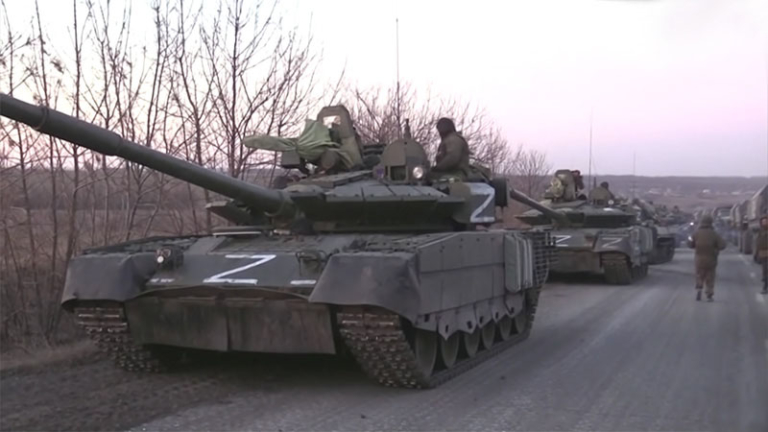
Since its launching on February 24, the ongoing Russian invasion of Ukraine has truly put different aspects of international law to the test. The international community has by and large come together to reject the Russian rationale behind the invasion and the resultant violations against Ukrainian territories and civilian infrastructure, installations, and population. In addition to its impact in Ukraine, the invasion has the distinct potential of influencing how the world sees the Israeli-Palestinian conflict and responds to Israel’s occupation of Palestinian and Syrian territories and its clear violations of Palestinian rights and security.
A Brief Look at the Origin and Development of International Law
International law develops gradually through the practices of states as well as the signing of international treaties. It received a significant boost following the Second World War as the nations of the world saw its resultant and tremendous devastation and embarked on rapid and steady steps to canonize then-extant rules and principles. The international community also embarked on creating and developing new institutions to diminish, if not totally eliminate, wars and to govern the behavior of states during and following conflicts. Subsequent decades saw the broadening and deepening of international principles and institutions, including the many organs of the United Nations.
Unfortunately, however, powerful states that were eager to start this process did not always want to be limited or bound by its provisions. Hence, for example, the authority to deal effectively with rogue states and their belligerent behavior was initially limited to the Security Council of the United Nations, as reflected in the UN Charter, where the five permanent members (the United States, the United Kingdom, France, China [under the nationalists’ rule at the time], and Russia) had veto power. Nonetheless, significant progress was made in many areas and respect for human and national rights increased as different treaties and conventions were signed and adopted for the protection of women, children, and indigenous peoples, as well as restricting the power of states to act as they see fit. (Incidentally, the International Committee of the Red Cross keeps a long list of multilateral treaties and conventions enshrining international law, including the dates of their adoption by different countries as well as those of their coming into force.)
The creation of the International Criminal Court (ICC) in 2002 was resisted by several countries, and the United States took action against it and threatened its judges and prosecutors if they dared investigate its own actions or citizens.
This process of developing international law institutions and widening its scope was significantly hampered in the last three decades, especially since 2001, as the United States changed its attitude toward international organizations following the end of the Cold War. It resisted their expansion or the restrictions they placed on its ability to exercise and project its power as it deemed fit. Even the creation of the International Criminal Court (ICC) in 2002 was resisted by several countries, and the United States took action against it and threatened its judges and prosecutors if they dared investigate its own actions or citizens.
Enter the Russian Invasion of Ukraine
As Russian forces invaded Ukraine, however, there was a sudden revival of interest in international law and its institutions and in making it more effective and relevant to current issues. In particular, three areas of vital importance, relevance, and applicability to the Israeli-Palestinian conflict emerged: the inadmissibility of occupying and annexing land by force; the use of sanctions and boycotts to penalize violators of international law; and the possible use of the ICC against war criminals and those who target civilians during periods of conflict. On each of these issues, there appears to be broad agreement on the necessity of stringently and firmly applying international law, with broad support coming from all directions, with the United States leading the way.
Occupation and annexation: international law has been clear and specific about both. There is an international consensus that it is inadmissible to take territory during war, or annex it and alter borders by force. This has been the bedrock of the international order that was established after World War II. While many countries have conflicts between them and claims against each other, and sometimes legitimate historical and/or security interests, there have been very few instances of attempts to annex neighboring territories. One glaring example is Israel’s occupation of East Jerusalem, the West Bank, the Gaza Strip, the Syrian Golan Heights, and the Sinai Peninsula in 1967. While it relinquished the Sinai in 1982 after signing a peace treaty with Egypt in 1979 and redeployed from the Gaza Strip in 2005, it annexed East Jerusalem and the Golan Heights, two actions in clear violation of international law (UNSC Resolution 478 regarding Jerusalem and Resolution 497 regarding the Golan) but that garnered the support of the Trump Administration.
Another example was Iraq’s invasion and attempt to annex Kuwait in 1990, which were roundly condemned and reversed with military force in 1991. Morocco occupied and annexed the western parts of the Western Sahara since 1975. The occupation and annexation has been rejected by the international community, but the Trump Administration recognized Morocco’s control in 2020 in exchange for the country’s joining the Abraham Accords for normalizing relations between Arab countries and Israel. Russia’s occupation of Georgian territories in 2008 and the annexation of Ukraine’s Crimea in 2014 constitute another current serious breach of international law that prohibits the acquisition of territory by force.
The current fighting in Ukraine seems to have helped to cause a reversal in America’s dilution of international law, and a revival of interest in asserting the latter’s principles of the inviolability of states and their borders and the rejection of actions by any state to invade or annex property of others, regardless of history or its excuses. The fact that the Donbas region on the eastern border of Ukraine is populated by Russian speaking people is not seen as a legitimate reason for it to secede, declare independence, or seek to join Russia. After all, that was the erroneous reasoning used by Nazi Germany to annex the Sudetenland region of Czechoslovakia in 1938 (allegedly to protect German speaking people there). The United States has not specifically referred to international law but to a “rules based” international order. Perhaps the use of this vague term is deliberate, but the effect is the same. It reinforces the principle in international law that it is not admissible to threaten, attack, or annex lands of other countries no matter the excuse.
Using the ICC to punish targeting civilian populations: international law restricts the behavior of states during warfare, prohibits the deliberate targeting of civilians, and designates such acts as war crimes requiring the use of the International Criminal Court to punish the perpetrators. Civilian casualties during warfare are cynically known as collateral damage, yet the deliberate targeting of civilian populations and hospitals and medical facilities has been strictly forbidden as illegal. Today, the Europeans may have needed the visual images of such barbarism by Russia against Ukrainians to remind them of the horrors of WWII in order to renew their interest in having such behavior punished with effective sanctions. The behavior of the United States and its forces in Iraq and Afghanistan, as well as the attacks on civilians in Gaza, Libya, or Yemen were too far and distant to arouse such determined interest. Perhaps both racism and hypocrisy played their part, but it is clear that such actions by Russia in Ukraine and against a white population with which Europeans can identify has been a new factor that could lead to a renewed interest in applying or even strengthening such restrictions.
It is clear that actions by Russia in Ukraine and against a white population with which Europeans can identify has been a new factor that could lead to a renewed interest in applying or even strengthening such restrictions.
Imposition of sanctions: the application of sanctions against a regime that blatantly violates international law has always been a possibility. Such is the case today with severe sanctions imposed on Russia. But especially in situations where governments are unwilling to take action against violators, civil society has often called upon individuals, corporations, and organizations to impose sanctions and boycotts or to refuse to trade with or provide services to those implicated in violations of international law. Within days or weeks of the Russian invasion of Ukraine, both governments and corporations announced measures to boycott Russia and its trade operations. Scores of corporations, including MacDonalds and Airbnb, joined an impromptu boycott and divestment campaign against Russia. Even cultural and sports organizations chimed in, freezing Russian athletes from competition in several sports.
Applicability to the Israeli-Palestinian Conflict
These three elements have great applicability to the Israeli-Palestinian conflict. Israel’s victory in 1967 left its army in occupation of Palestinian and Arab lands. While East Jerusalem and Syria’s Golan Heights have been annexed by Israel, the West Bank is slowly being swallowed up by settlement building and expansion in another clear violation of international law which has been clear about the illegality of settling civilians in occupied territories or annexing these outright. This has not changed with the passage of time, and Israel has been benefiting from American vetoes at the United Nations Security Council as well as from the absence of a determined international response that would prevent de facto annexation.
Israel has been benefiting from American vetoes at the United Nations Security Council as well as from the absence of a determined international response that would prevent de facto annexation.
Similarly, in its attacks on Gaza, Israel has used its overwhelming military force to bombard the civilian population and target individual residences and high-rises. In Beirut, Israel even introduced the ‘Dahiye Doctrine’ (in reference to the city’s southern suburb) to justify totally destroying whole neighborhoods in its attacks on Hezbollah targets. Israeli ministers often openly threaten to destroy civilian infrastructure in Lebanon, which constitutes a war crime. They do not hide their intent to bomb Lebanon “back to the middle ages,” a declaration that constitutes a war crime. The recent reports of Amnesty International, Human Rights Watch, and B’tselem, among others, regarding Israel’s crime of apartheid should also be worrying to Israeli officials who could face individual charges before the International Criminal Court that lists apartheid as one of the bases for its jurisdiction. The ICC’s investigation into Israel’s war crimes has been slow—due in no small part to obstruction and threats by the United States. But with widespread calls for a similar inquiry into Russia’s alleged war crimes in Ukraine, it would be difficult for Israel to continue to enjoy impunity for its own violations against Palestinians.
Finally, the rapid employment of sanctions against Russia and its officials and their assets, as well as the quickly organized boycotts and divestment from Russian projects, make the efforts of pro-Palestinian elements to organize boycott, divestment, and sanctions (BDS) activities fully legitimate. In sports, for example, players were told that “sports and politics don’t mix” and several individuals were banned from competition because they openly wore Palestinian flags or slogans or refused to play Israeli competitors in protest of Israel’s occupation. Such actions are now seen as legitimate, and we are bound to see more of them.
To be sure, international law and solidarity have arguably received a great boost after the Russian invasion of Ukraine. The international community’s quick and decisive response to the Russian act can be seen as a harbinger of things to come. What remains to be seen are the actual impact of the invasion on the Middle East and the speed with which that effect will be felt regarding the true and consistent application of international law.

